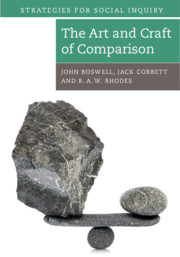
-
Select format
-
- Publisher:
- Cambridge University Press
- Publication date:
- October 2019
- October 2019
- ISBN:
- 9781108561563
- 9781108472852
- 9781108460668
- Dimensions:
- (247 x 174 mm)
- Weight & Pages:
- 0.45kg, 174 Pages
- Dimensions:
- (247 x 174 mm)
- Weight & Pages:
- 0.32kg, 174 Pages
- Subjects:
- Research Methods in Politics, Research Methods in Sociology and Criminology, Research Methods In Sociology and Criminology, Qualitative Research Methods, Politics and International Relations, Research Methods In Politics
- Series:
- Strategies for Social Inquiry
You may already have access via personal or institutional login- Subjects:
- Research Methods in Politics, Research Methods in Sociology and Criminology, Research Methods In Sociology and Criminology, Qualitative Research Methods, Politics and International Relations, Research Methods In Politics
- Series:
- Strategies for Social Inquiry
Book description
Is it possible to compare French presidential politics with village leadership in rural India? Most social scientists are united in thinking such unlikely juxtapositions are not feasible. Boswell, Corbett and Rhodes argue that they are possible. This book explains why and how. It is a call to arms for interpretivists to embrace creatively comparative work. As well as explaining, defending and illustrating the comparative interpretive approach, this book is also an engaging, hands-on guide to doing comparative interpretive research, with chapters covering design, fieldwork, analysis and writing. The advice in each revolves around 'rules of thumb', grounded in experience, and illustrated through stories and examples from the authors' research in different contexts around the world. Naturalist and humanist traditions have thus far dominated the field but this book presents a real alternative to these two orthodoxies which expands the horizons of comparative analysis in social science research.
Reviews
‘Against those who would seek to either constrict or suppress the comparative intuition, Boswell, Corbett, and Rhodes make a brilliant case for an open and artful use of comparison in the social sciences. Comparing, they show, can be a creative act in which discovery, plausible conjecture, and unlikely juxtaposition figure prominently. A mind-opening perspective, colorfully presented, from which all social scientists can learn.'
Frederic Schaffer - University of Massachusetts, Amherst
‘… refreshingly honest, pragmatic and easy-to-follow, explaining how scholars within the broad interpretive tradition can adapt their research for comparative social science.'
Marc Geddes - European Consortium for Political Research
Contents
Metrics
Altmetric attention score
Full text views
Full text views help Loading metrics...
Loading metrics...
* Views captured on Cambridge Core between #date#. This data will be updated every 24 hours.
Usage data cannot currently be displayed.
Accessibility standard: Unknown
Why this information is here
This section outlines the accessibility features of this content - including support for screen readers, full keyboard navigation and high-contrast display options. This may not be relevant for you.
Accessibility Information
Accessibility compliance for the PDF of this book is currently unknown and may be updated in the future.


